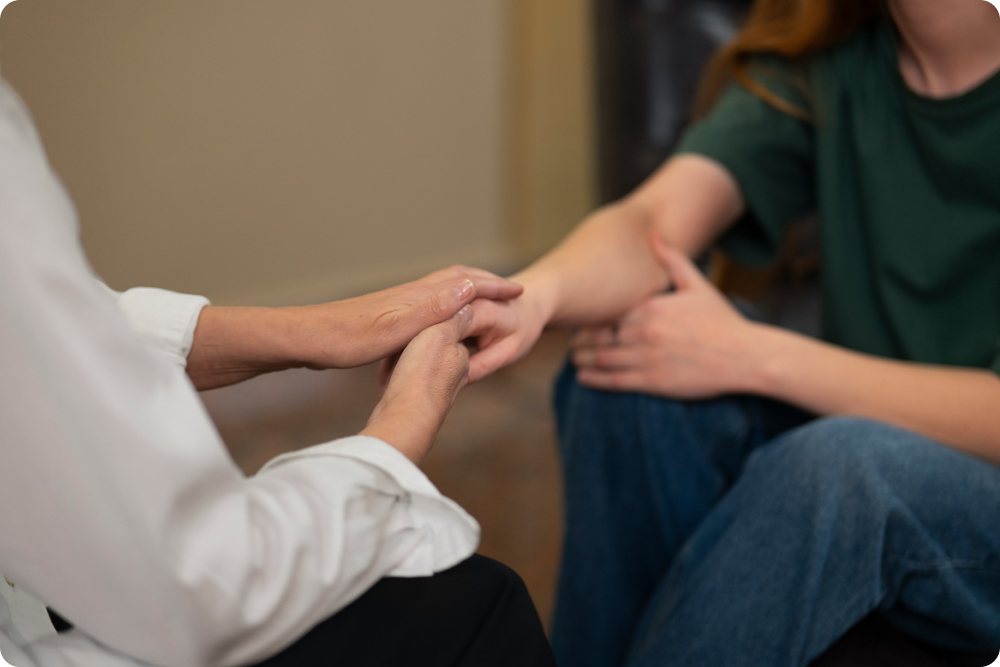OCD and Depression: Symptoms, Causes, and How to Get Help
“I can’t stop these thoughts, and I’m so tired of fighting them. Sometimes I wonder if it’s even worth trying anymore.” These words capture the overwhelming experience of living with both OCD and depression. As a psychologist specializing in OCD treatment, I’ve witnessed how these conditions can become intertwined, each one intensifying the other’s impact.
Living with OCD and depression can feel like carrying a double burden. The relentless nature of obsessive thoughts demands constant mental energy, while depression drains the very resources needed to cope. Simple daily tasks that others seem to manage effortlessly – from morning routines to social interactions – can become overwhelming challenges.
Yet, I’ve also seen many individuals find their way through these challenges to build more fulfilling lives. While the path isn’t always straightforward, understanding how these conditions interact and learning evidence-based strategies to manage them can make a profound difference.
In this comprehensive guide, I’ll share insights from both clinical research and my experience working with clients to help you understand:
- How OCD and depression influence each other
- Common symptoms and challenges when these conditions co-occur
- Evidence-based treatment approaches that can help
- Practical strategies for managing daily life
- When and how to seek professional support
Whether you’re struggling with these conditions yourself or supporting someone who is, knowing you’re not alone in this experience is an important first step. Let’s explore how you can start moving toward better mental health, one step at a time.
How OCD and Depression Are Connected
OCD and depression interact in a challenging cycle. The relentless nature of obsessive thoughts and compulsive behaviors can drain emotional resilience, while depression’s fatigue and hopelessness can make it harder to resist OCD’s demands.
Research suggests that up to two thirds of people with OCD will also experience depression at some point in their lifetime. This isn’t surprising when we consider how OCD affects daily functioning; maintaining relationships, completing work tasks, engaging in activities that once brought joy are negatively impacted. The exhaustion of constantly battling intrusive thoughts, combined with the isolation that often follows, creates fertile ground for depression to take root.
Signs and Symptoms of OCD and Depression

While each person’s experience is unique, certain patterns commonly emerge when depression and OCD overlap.
OCD Symptoms
- Persistent, unwanted thoughts or images that trigger anxiety
- Repetitive behaviors or mental rituals intended to reduce distress
- Difficulty letting go of intrusive worries or doubts
- Time-consuming rituals that disrupt daily life
- Avoidance of people, places, or activities that might provoke obsessions
Depression Symptoms
- Persistent sadness, emptiness, or hopelessness
- Loss of interest in activities once enjoyed
- Changes in sleep patterns or appetite
- Difficulty concentrating or making decisions
- Overwhelming feelings of guilt or worthlessness
- Fatigue or low energy
- Recurring thoughts of death or suicide
When these conditions occur together, you might notice:
- Increased difficulty resisting compulsions due to emotional exhaustion
- Greater isolation caused by the withdrawal associated with both conditions
- Heightened self-criticism and guilt related to OCD symptoms
- Intensified feelings of hopelessness, making recovery seem unattainable
If you recognize any of these experiences in your own life, help is available. While it’s natural to try to understand what you’re experiencing, an accurate diagnosis can only come from a licensed mental health professional. Through a thorough evaluation, they can develop a treatment plan tailored specifically to your needs and circumstances.
Effective Treatments for OCD and Depression

The treatment of OCD and depression is most effective when we address both conditions together, using a well-rounded approach personalized to your unique situation. Let me walk you through what this might look like.
Evidence-Based Therapy Approaches
Several therapeutic approaches have proven particularly helpful:
- Cognitive Behavioral Therapy (CBT) helps you identify and reshape thought patterns that may be maintaining both conditions
- Exposure and Response Prevention (ERP), the gold-standard treatment for OCD, guides you in gradually facing fears while reducing reliance on compulsions
- Behavioral Activation helps combat depression by reconnecting you with meaningful activities and breaking cycles of avoidance
- Mindfulness Techniques provide practical tools for managing intrusive thoughts and navigating difficult emotions
Understanding Medication Options
As a psychologist, I do not prescribe medication. However, I often collaborate with psychiatrists (medical doctors specializing in psychiatric medications) who can evaluate whether medication might be helpful as part of your treatment plan. Common options include:
- Selective Serotonin Reuptake Inhibitors (SSRIs) which can help regulate mood and reduce anxiety symptoms in both conditions
- Other Antidepressants that might be recommended based on your specific needs and symptoms
The key is finding the right combination of treatments for your situation. Together, we can develop a treatment plan that addresses both conditions, all while honoring your individual needs and preferences.
By addressing both OCD and depression together the likelihood of lasting recovery increases. The right treatment will help you gradually build resilience against OCD while rekindling the energy and hope that depression may have diminished.
Simple Strategies for Managing OCD and Depression
While working with a mental health professional is essential for recovery, there are also meaningful steps you can take in your daily life to support your progress. I’ve found that incorporating certain practical strategies helps my clients maintain momentum between therapy sessions and build on their progress after completing treatment. Here are some approaches that have made a significant difference:
Creating Helpful Routines
Predictable daily patterns can provide an anchor when OCD and depression feel overwhelming. Start small. Maintaining consistent meal times or a simple morning routine can help build a foundation for stability. Remember, the goal isn’t perfection but rather creating gentle structure in your day.
Practicing Self-Compassion
Both OCD and depression are harsh critics. When you notice self-critical thoughts arising, try to respond to yourself with the same kindness you would offer a friend. This isn’t about forcing positive thinking – which is actually quite unhelpful; rather, – it’s about acknowledging that you are doing your best while facing real challenges.
Staying Connected
Both OCD and depression can pull us toward isolation, yet maintaining human connection is vital for your wellbeing. Even small steps toward connection can help – whether it’s sending a quick message to a friend, joining an OCD support group, or simply spending time in spaces where others are present. These moments of connection, however brief, can provide comfort during difficult times and remind us we’re not alone.
Rest and Sleep
Getting quality sleep is challenging when managing OCD and depression, and it is a vital part of emotional health. Rather than aiming for “perfect” sleep, focus on creating a calming bedtime environment. This might mean dimming lights an hour before bed, keeping your bedroom cool and quiet, or practicing gentle relaxation exercises.
Reconnecting with Activities That Once Felt Good
Depression can make it difficult to find enjoyment in anything, while OCD might create anxiety around activities you used to love. Rather than seeking immediate joy or perfect execution, try to gradually return to activities that felt good before these conditions intensified. This might be walking around your neighborhood, stretching in the morning, or dancing to music – even if OCD brings up worries about doing them.
Tracking Your Journey
Keeping a simple record of your experiences can help you recognize patterns and progress. Notice what activities, situations, or strategies help you feel more grounded, and which ones might need adjustment. This information can be valuable to share with your therapist as you work together.
Think of these strategies as flexible tools you can draw upon when needed. Start small, be patient with yourself, and take note of each step you take.
Special Considerations for OCD and Depression

Supporting Teens with OCD and Depression
Adolescence brings significant emotional, physical, and social changes that can make managing OCD and depression particularly challenging. For teens, these conditions often manifest in unique ways; OCD might focus on academic performance, social interactions, or moral concerns, while depression can affect concentration, social relationships, and overall mood.
Teens often face additional pressure trying to balance their mental health challenges with school demands, social life, and family expectations. The combination of OCD and depression can make everyday tasks like completing homework or maintaining friendships feel overwhelming.
Early intervention makes a significant difference! Through evidence-based treatments like CBT and ERP, teens can develop effective tools for managing their symptoms. Parents play a crucial role by recognizing early signs and helping their teen access appropriate support. With proper treatment, teens can learn to manage these challenges while building confidence and resilience for their future.
Postpartum OCD and Depression
New parents might experience intrusive thoughts about their baby’s safety – a form of OCD that’s actually quite common – alongside symptoms of postpartum depression. The combination of hormonal changes, sleep deprivation, and the profound adjustment to parenthood can intensify both conditions.
If you’re a new parent experiencing thoughts , please know that they don’t reflect your character or abilities as a parent. These are symptoms of treatable conditions, and specialized support is available.
When to Seek Help for OCD and Depression
While experiencing ups and downs is natural, certain situations signal that it’s time to connect with a mental health professional.
Consider reaching out if you notice:
- Your symptoms are interfering more with daily activities or relationships
- Existing coping strategies aren’t providing the relief they once did
- You’re withdrawing more from social connections
- Sleep or appetite changes are becoming more pronounced
- You’re having thoughts about harming yourself
Again, do not self-diagnose. Mental health professionals who specialize in OCD and depression can:
- Help evaluate changes in your symptoms
- Adjust treatment strategies as needed
- Provide additional tools for managing challenging periods
- Collaborate with other healthcare providers if needed
Looking Forward

OCD and depression can feel like carrying a double burden, but lasting improvements are possible. Many people who once felt trapped by these conditions have found their way to more manageable, fulfilling lives.
The path to better mental health isn’t always direct – there may be periods of progress and times when things feel more challenging. What matters most is that you’re taking steps, no matter how small, toward greater wellbeing.
If you’re struggling with OCD and depression, I encourage you to take that first step. I offer free 15-minute consultations where we can discuss your specific situation and explore how I might help. Together, we can develop an approach that works for you.
This article is for informational purposes only and shouldn’t be used for self-diagnosis. If you’re experiencing symptoms of OCD or depression, please consult with a licensed mental health professional for proper evaluation and treatment.
